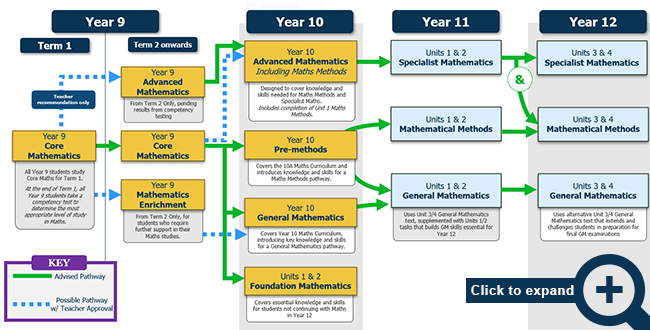General Mathematics
Year 11 - Elective
General Mathematics Units 1 and 2 cater for a range of student interests and provide preparation for the study of General Mathematics Units 3 and 4. The areas of study for Units 1 and 2 are 'Data analysis, probability and statistics', 'Algebra, number and structure', 'Functions, relations and graphs' and 'Discrete mathematics'.
In undertaking these units, students are expected to be able to apply techniques, routines and processes involving arithmetic, lists and tables, diagrams and geometric constructions, algebraic manipulation, equations and graphs, with the use of technology. The use of numerical, graphical, geometric, symbolic, financial and statistical functionality of technology (CAS calculator) will be emphasised.
Planning your VCE Mathematics
Curriculum focus
Unit 1 comprises of the topics:
Measurement
Trigonometry
Linear Equations and Graphs
Univariate Data
Unit 2 comprises of the topics
Bivariate Data
Recursion and Financial Modelling
Matrices
Networks and Graph Theory
Assessment
The award of satisfactory completion for a unit is based on whether the student has demonstrated the set of outcomes specified. Teachers use a variety of learning activities and assessment tasks to provide a range of opportunities for students to demonstrate the key knowledge and key skills in the outcomes.
Outcome 1: define and explain key concepts as specified in the content from the areas of study and apply a range of related mathematical routines and procedures.
Outcome 2: apply mathematical processes in non-routine context, including situations with some open-ended aspects requiring investigative, modelling or problem-solving techniques or approaches, and analyse and discuss these applications of mathematics.
Outcome 3: apply computational thinking an use numerical, graphical, symbolic and statistical functionalities of technology to develop mathematical ideas, produce results and carry out analysis in situations requiring investigative, modelling or problem-solving techniques or approaches.
The award of grades and scores for the course is based on the achievement from learning and assessment items throughout the course, such as the mathematical investigation, assignments, tests, summary notes, group work and set questions. Use of CAS calculator and a Summary Book is allowed in all tasks.
Links
For more detailed information, please click on the link/s below:
Key Resource
Cambridge General Mathematics Units 3&4 Second Edition (print and digital)
Casio Classpad 400 FX-CP400 with padded wallet
